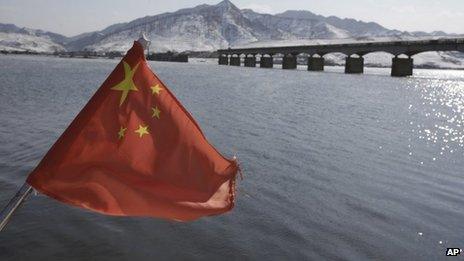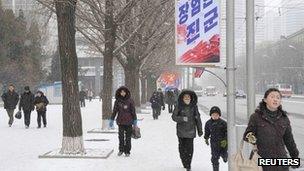China's delicate balancing act with North Korea
- Published

Trade between China and North Korea is rising, but it is unbalanced
North Korea's nuclear test came at an inconvenient time for Chinese diplomats. While millions across China celebrate the Lunar New Year, Beijing's foreign ministry workers were forced to grapple with Pyongyang's nuclear ambitions.
Perhaps fatigue from the festivities explains Beijing's tepid response to the problem.
Foreign Minster Yang Jiechi summoned North Korea's ambassador to a meeting in which Mr Yang voiced his displeasure over the underground nuclear test.
A formulaic statement from the ministry then proposed a return to the six party talks - a series of multi-national negotiations aimed at ending North Korea's nuclear ambitions.
'Dialogue' not 'barbs'
Calls to restart the talks were echoed in commentaries published in China's state-run media.
"Dialogue and negotiations, instead of confrontation and trading barbs, are the optimal means to eventually solve the nuclear crisis on the Korean Peninsula," says the Global Times, a newspaper known for its nationalist stance on major issues.
Both the foreign ministry and the Global Times failed to mention that the talks were last convened in 2007.
In 2009, North Korea announced it would never return to the talks. A plan to restart negotiations in 2012 was cancelled after Pyongyang attempted to launch a satellite in April of that year.
What if China really wanted to voice anger over North Korea's budding nuclear programme? Beijing would need to drop its diplomatic efforts in favour of economic sanctions.
Unbalanced trade
With little notice, Beijing could decimate North Korea's flimsy economy by limiting trade between the two countries, explains Marcus Noland, senior fellow and director of studies at the Peterson Institute for International Economics in Washington DC.
Trade between China and North Korea is rising, but it is extremely unbalanced, said Dr Noland.
"China accounts for 70% of North Korea's trade. North Korea accounts for less than 1% of Chinese trade," he said.
China's north-eastern Jilin province would be affected by a steep drop in business with North Korea, but few other regions would notice a change.
"If China were to decide to impose an economic embargo on North Korea, it would be absolutely crippling to North Korea and would essentially be unobservable to the Chinese economy," said Dr Noland.

North Korea's fuel needs are serviced by China - a major consideration in winter
Moreover, the size of China's food aid contributions to North Korea is unclear, but it is believed that China donates a large percentage of the North's food supply.
Even more importantly, North Korea's fuel needs are serviced by China. That is a major consideration in the middle of winter.
Beijing's wrath
"If you turn off the oil pipeline, and there is literally a pipeline, the North Koreans freeze pretty quickly," Dr Noland explains.
China is thought to have reduced oil shipments to North Korea in the past. Following a missile test by the North in 2003, China temporarily cut off oil shipments though its pipeline, though it blamed technical problems for the suspension.
Still, the decision to limit trade or aid with North Korea again would not be taken lightly.
Average people in North Korea would certainly feel the effects of Beijing's wrath before Pyongyang's political elite.
Also, Beijing would have to carefully consider any option that could lead to the collapse of the North Korean state, a possibility that could lead to millions of North Korean refugees pouring into China.
Dr Noland believes that the tipping point in China's tolerance for North Korea rests with the delicate power balance in Asia.
"If North Korea really ever provokes the United States and South Korea and Japan, then China may wake up," he said. "A real arms race in north-east Asia is not in China's interest."
That possibility lies on the horizon. For now, Beijing's beleaguered diplomats are left to deal with China's troublesome neighbour.
- Published13 February 2013
- Published12 February 2013
- Published13 February 2013
- Published13 February 2013
- Published12 February 2013